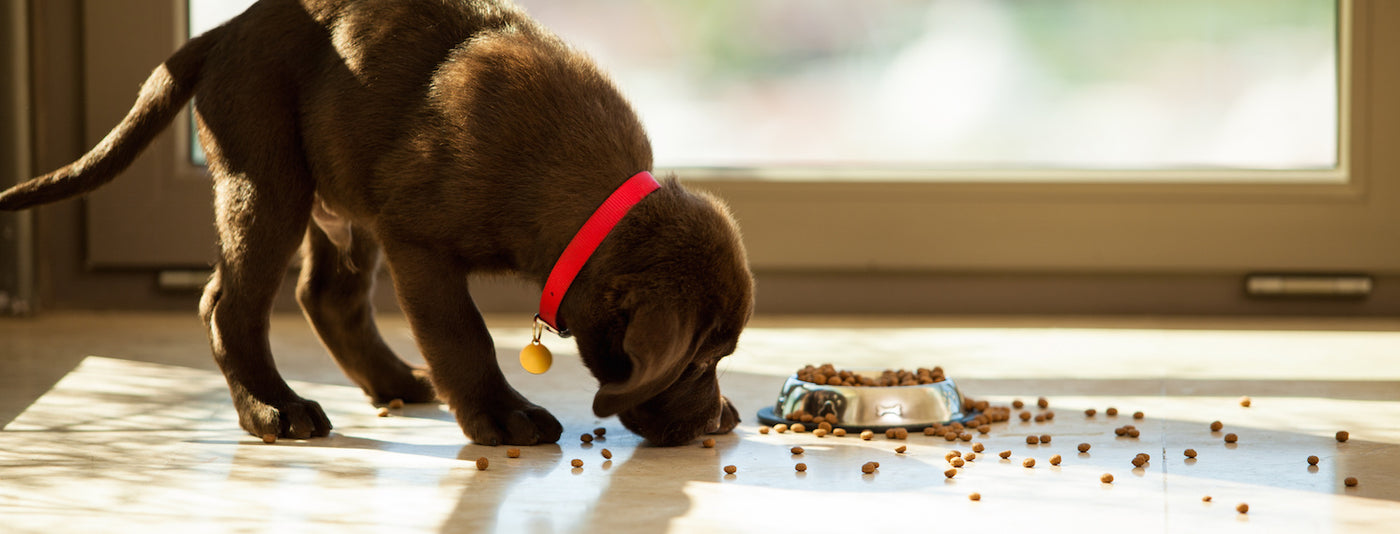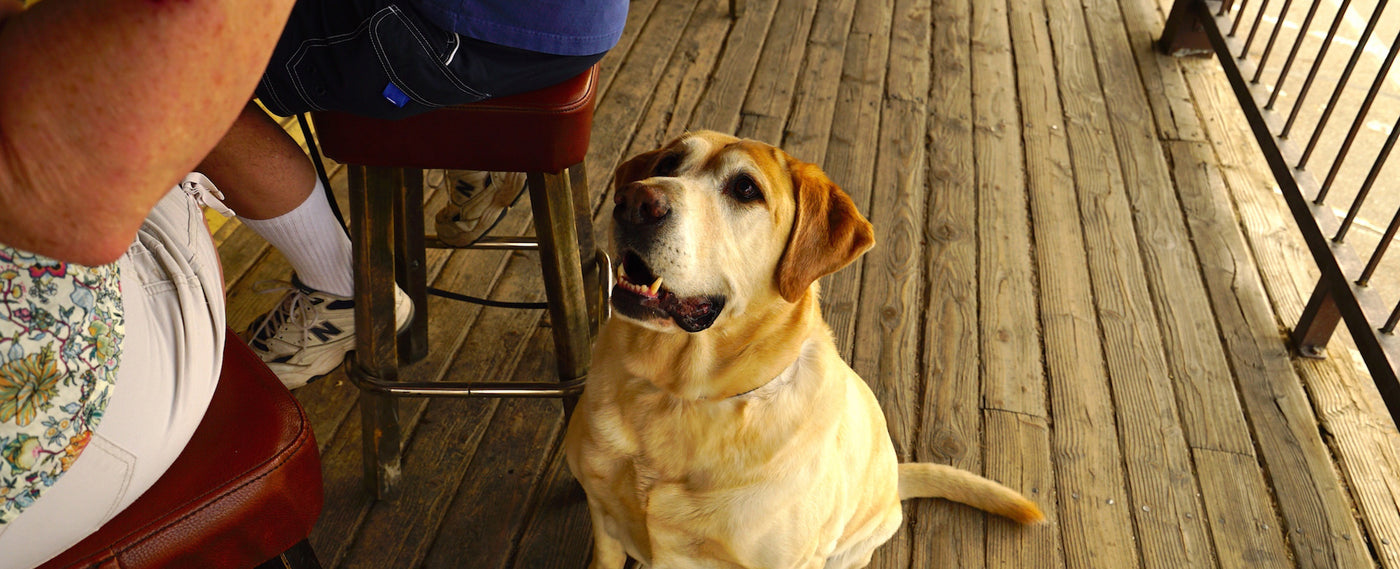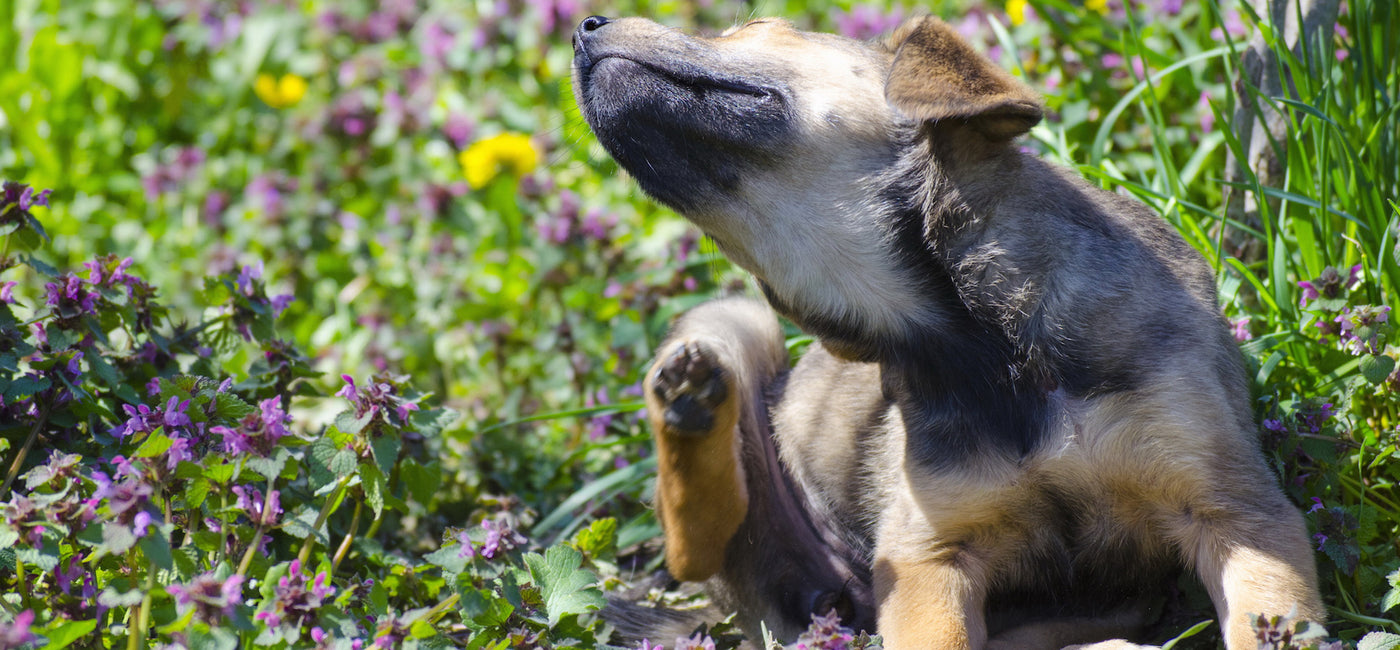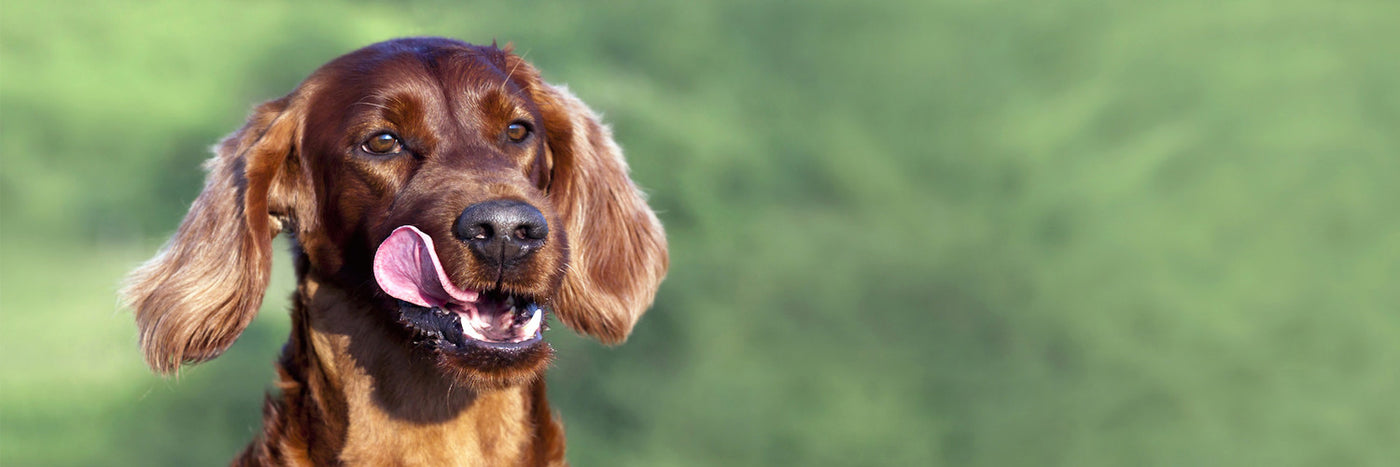
Cereals and grains - Good or bad for our dogs?
As dog owners, we’re becoming more and more aware about exactly what it is we’re putting into their bodies and whether or not their nutritional demands are being satisfied by the very food we spend our hard earned money on. One question we get asked a lot here at Pooch DVD is whether or not we should be avoiding pet food containing cereals and grains and whether they’re damaging to our pet’s health.
Firstly, cereals and grains refers to anything from wheat, rice and barley through to oats and maize - all of which tend to be the usual accompaniment to the meats you’d expect to find in pet food. But are they good or bad?
Anyone that knows us here at Pooch DVD will know that we’re big supporters of protein based diets for dogs. After all, canine bodies flourish when fed nutritional, high energy meats. We’re not supporters of the processed pet foods found in most supermarkets - these are by no means beneficial to your much loved pet. You’ll probably find that brands whose pet food contains cereals and grains haven’t done so for your dog’s nutritional benefit - instead they’re there to act as a cheap filler, to make your dog’s tummy feel fuller and to ultimately increase their profits.
Just like us humans, every dog and the way in which their body reacts to food, is unique. Some dogs may have sensitive tummies that aren’t able to easily digest certain cereals and grains, while other dogs may well be able to. Grains and cereals may not necessarily be damaging to your pet’s health, but if the food in which your pet is eating has substituted healthy ingredients for more filling material, this could pose a health problem later down the line. It’s also worth noting that if you notice that your dog is producing unhealthy stools or their skin/coat is looking unhealthy, opting for grain-free pet food such as Smolke can often work wonders.
- Ben Abimbola
- Tags: BARF diet Cereals & grains Dog Food Dog Health Dog Nutrition

What is a BARF Diet?
BARF dieting - what every dog owner needs to know
BARF dieting is by no means a new concept, however more and more dog owners are now turning to this form of feeding due to the amazing benefits it can have on pet health and wellbeing.
In fact, this type of dieting has proven to offer a natural and healthy solution to a whole range of health problems, including relief from digestive problems, allergies, degenerative diseases and even skin conditions.
What does BARF dieting mean?
For those of you that aren’t familiar with the term, BARF stands for Biologically Appropriate Raw Food or Bones and Raw Food. This diet consists of raw whole foods, such as meat, bones, fat, organ meats, fruit and vegetables.
What about shop bought dog food?
Cooked and processed foods are a big no-no when it comes to BARF dieting, as are any foods containing preservatives, colouring agents, additives, grains or other fillers designed to make a dog feel fuller for longer. A lot of supermarket bought pet food contains some of these harmful ingredients, which can cause a whole range of long-term health problems for pets, as opposed to the wonderfully healthy benefits of a barf diet.
So, what are the benefits of a BARF diet?
- Relief from irritating skin conditions, particularly those caused by allergies
- A shiny coat thanks to the range of nutrients and vitamins
- Healthy teeth and a fresher breath, including minimal tar build-up
- Leaner, trimmer weight and healthier shape
- Strengthened immunity thanks to the perfect balance of essential nutrients, vitamins and fatty acids
- Easier on the tummy and therefore ideal for dogs with digestion problems
- Quick and easy absorption of nutrients given the natural ingredients
- Increased mobility and improved energy levels
- Reduced stool odour, a clear sign of healthy digestion
- A longer, healthier and happy life
Interested in a BARF diet for your cat or dog?
If you’re looking to introduce your dog, or cat for that matter, to a BARF diet, why not browse our range of fresh, natural and incredibly healthy food products!
- Ben Abimbola
- Tags: BARF diet Cat Diet Cat Food Dog Diet Dog Food Dog Health Dog Nutrition Raw Foods

Human foods that you should never give to your dog
As persuasive as those puppy-dog eyes may be peering up at you from beneath the dinner table, you may just want to hold off sharing your delicious grub with your dog after reading this article. Why? Believe it or not, there are actually quite a few ‘human foods’ that we as owners should completely avoid feeding to our pooches due to their health-damaging side effects. Even if you’ve shared any of these food items to your pup in the past with no signs of any health problems, don’t be fooled - there are some side effects that aren’t always completely obvious.
Here’s a list of our top 5 doggy no-no’s!
- Chocolate (and any other sugary foods). Hopefully the majority of dog owners are already aware of this one, as it’s one of the worst things you could feed your pooch. Chocolate actually contains Theobromine, an ingredient that isn’t damaging to humans but is particularly toxic for dogs. And don’t think that you’re playing it safe by giving your pooch dark chocolate because this harmful ingredient is actually found in all kinds of chocolate. What are the possible side effects? From vomiting and diarrhoea to seizures and tremors or even fatalities, we highly advise you to keep chocolate of all kinds away from your beloved dog.
- Bacon (and any other fatty foods). Oh yes, the one thing that gets their little noses twitching is bacon! But unfortunately, it’s on the list of no-no’s. Being an extremely salty meat, dogs can become excessively thirsty, causing them to over-drink and possibly bloat which can be dangerous. It’s also a high in fats, which can damage your pup's pancreas.
- Dairy. Who would have thought a bowl of milk could be harmful to dogs? But it is. As surprising as it may be, cow products are difficult for a dog’s stomach to process, causing tummy upsets or worse. And just like certain meats, dairy with high fat content can once again cause pancreatic problems for your pooch, so avoid sharing the occasional cube of cheese, it’s really not worth taking the risk.
- Raisins (and grapes for that matter). These are both no-no's. Something so small can actually have a huge impact on your dog’s health, including renal failure. Sounds horrible doesn’t it. Believe it or not, feeding your dog this little snack can actually be fatal, so just don’t do it - even if they’ve been fine in the past.
- Raw meat. OK so this one is not necessarily a ‘human food’ as not a lot of us would find a raw chicken breast particularly appetising but we thought we’d better mention it just in case. There are a lot of misconceptions when it comes to feeding dogs raw meat, but the truth is, they face the same potential health risks as we do, from salmonella poisoning to e-coli. Your dog’s food, just like yours, needs to be cooked thoroughly to avoid some very unpleasant health problems.
The reality is, not all dog owners are aware of the damaging effects our own food can have on our pets. We’ve got a whole range of highly nutritious and flavoursome dog foods and snacks listed that you’re pup is sure to love! Shop here...
- Ben Abimbola
- Tags: Dog Care Dog Diet Dog Food Dog Health Dog Nutrition

Caring for a dog with a skin condition
Just like us humans, our dogs can often suffer from unpleasant skin conditions that may cause irritation and discomfort. However, there’s no need to worry. You’ll probably be surprised to learn that skin conditions in pets are very common and highly treatable with the right level of care and possibly even medication - depending on the severity of the condition and the underlying cause.
How do I know if my dog has a skin condition?
If you’ve recently become the proud parent to a dog - congratulations! But you may not know exactly what to look for to determine whether or not your dog has a special condition that needs to be cared for. So, we’ve listed some of the most obvious signs and things to look for:
- Scratching. One of the first signs of a skin condition is of course irritation. Continuous scratching is a common symptom of a skin condition however your dog may still have a condition even if there are no obvious signs of irritation. If he or she does appear to be scratching excessively, check the area for any visible scabs.
- Licking. Similarly to scratching, sometimes dogs with skin conditions find comfort in licking the affected area i.e. their paws. Try and investigate the problem as quickly as you can as over-licking can make the problem very red and tender.
- Lack of hair. Sometimes a skin condition may result in your pooch developing bald patches or simply a dull looking coat, in which case, may indicate a skin condition, illness or allergy.
- Dandruff. Just like we humans may suffer from a dry scalp, our pooches may experience dry skin too, resulting in visibly flaky dead skin. Depending on the colour of your dog’s coat, your pooch’s dandruff may become visible in his or her hair.
What to do if you suspect your dog may be suffering from a skin condition
From allergies and fleas, all the way through to skin diseases, there are a whole range of possible causes, so the first and best route to take is visiting your vet. They’ll find the route cause and make recommendations on how to care for your dog’s condition going forward. Depending on the cause, treatments may include specially formulated shampoos, supplements, medicine, avoiding certain food types and so forth.
If you do find that your pet’s condition is manageable with special pet shampoos, we highly recommend the VETiONX range - aimed at both dogs and cats. And, like just like the experts say, we are what we eat - so choosing your dog’s food wisely can also work wonders on his/her skin. For example, opting for a food that contains all the essential vitamins and nutrients, such as omega-3 fatty acids, can often help to ease the irritation and also any inflammation of the affected area. We stock a whole range of quality, fresh and nutritious food options, some of which are specifically designed to cater for pets with allergies and conditions.
- Ben Abimbola
- Tags: Dog Health Dog Nutrition Grooming

Is your dog getting the right nutrition?
We take our own consumption of food seriously - and the same should also apply for our dogs., right? Absolutely. To live a long, healthy life, it’s important that our furry friends consume food that’s packed with all of the necessary vitamins and minerals needed, in the correct balance of course.
Just like humans, our pets need to a good combination of nutritious foods, including fats, protein, carbohydrates - you name it. All of these essentials will ensure your dog remains energetic, fit and healthy at all times. Getting all of these ingredients in the right proportion for your pet is important and that’s why it’s always important to check the nutrition label. For example, pet food manufacturers design food for dogs at specific ages (i.e. puppy and adult) and they also cater food for dogs with specific health conditions such as heart disease.
We work with man’s best friend on a daily basis and can honestly say that there is a clear and very visible difference between a dog that is receiving the correct nutrition and a dog that is not. Those that are well nourished will maintain excellent muscle tone, healthy teeth, bones and coat, quality digestion, as well as maintaining a fantastic ability to perform at their best physically.
And just like humans, a health dog will be able to fend off nasty infections much better than a dog that isn’t receiving a well balanced diet. As owners, we want to guarantee our pets a long, quality lifestyle and so our best chances of achieving this are to provide the highest quality of food possible.
The best quality food for dogs are those that contain human-grade ingredients, including Omega 3 and Omega 6 fatty acids. Lower quality food on the other hand, is likely to contain sources of protein that us humans wouldn’t even think of consuming - including chicken beaks. Lower quality foods are also more likely to contain artificial ingredients, sugars and other unhealthy additives that will make their foods taste better, but have an overall negative impact on our pup’s health.
Our recommendation to our fellow dog owners is to check the label before purchasing your next bag of dog food - just as you would your own. Because for our pets to live a long happy life, it all starts with what enters their bodies. You are what you eat, after all. To see our preferred dog food providers, browse the pet food collection within our catalogue.
- Ben Abimbola
- Tags: Dog Food Dog Health Dog Nutrition